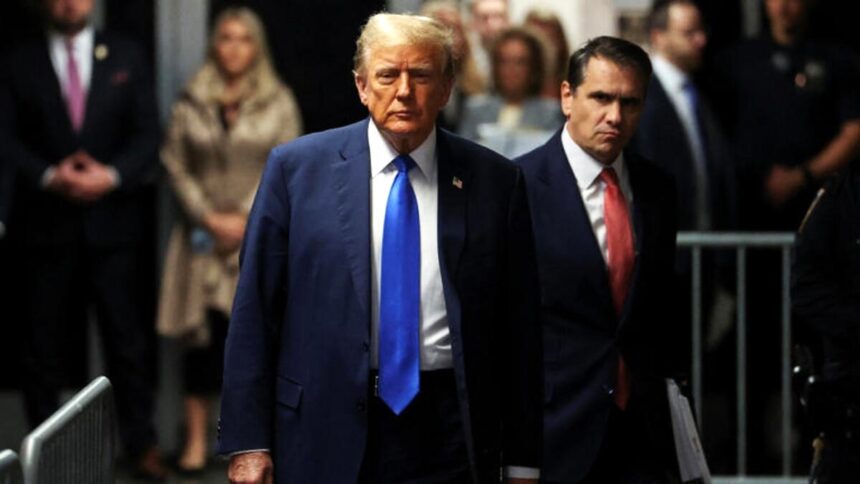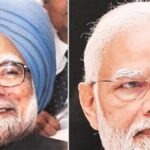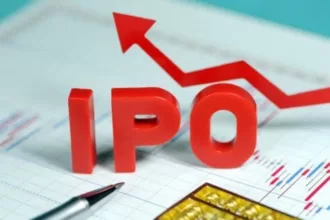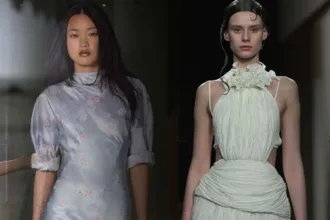At the beginning of Donald Trump’s historic hush money trial, a prosecutor told jurors on Monday that the former president “orchestrated a criminal scheme to corrupt” the 2016 presidential election.
In their opening remarks, prosecutors accused Trump of a plot to keep negative details about his personal life from being made public. This was the first-time prosecutors had brought a criminal case against a former president to a jury.
A criminal plan to taint the 2016 presidential election was conducted by the defendant, Donald Trump. Then, as prosecutor Matthew Colangelo repeatedly reminded jurors, he covered up that illegal conspiracy by lying in his New York company papers.
In addition to providing the 12-person jury and the electorate with the clearest picture yet of the charges at the center of the case, the prosecution’s and Trump’s attorneys’ comments are anticipated to provide light on the expected defense of the president.
A colorful cast of characters, including a porn star who claims to have had a sexual encounter with Trump and the lawyer who prosecutors claim paid her to remain silent about it, will also be introduced by attorneys in anticipation of their testimonies over the made-for-tabloids story.
Just before nine in the morning, Trump appeared to the courthouse, having just hours before denounced the case in all caps on social media as “election interference” and a “witch hunt.”
Though it’s unclear if the court will try to send him behind bars, he is facing 34 felony charges of fabricating company documents, a penalty that carries a maximum four-year jail sentence. Trump would still be eligible to run for president in the future despite the conviction, but he would not be able to ask for a pardon as the matter is being handled at the state level. He has vehemently denied any misconduct.
The trial, which is taking place as Trump fights for the presidency, will force him to spend his days in court rather than on the campaign trail. This is something he bemoaned to reporters on Monday morning upon his arrival, saying it was very unfair that he couldn’t be campaigning in Pennsylvania, Georgia, or any other state.
Not only did Trump have to endure a jury selection process during which a number of possible jurors had unfavorable thoughts about him, but he will also have to stay in court while the jury is presented with scandalous and possibly embarrassing information about his personal life.
Despite this, Trump has made an effort to use his criminal defendant status to his advantage during the campaign, collecting money off of his legal troubles and frequently criticizing a court system he has long maintained is biased against him.
A jury made up of several attorneys, a salesperson, an investment banker, and an English teacher will hear the case. Judge Juan Merchan said at Monday’s court session that one of the jurors chosen for the case had shown reluctance to serve, presumably due to the case receiving a lot of media attention. Though privately questioned, the juror will continue to serve on the panel.
In addition to putting jurors’ capacity to ignore prejudice to the test, the case will assess Trump’s compliance with court orders, such the gag order that prevents him from disparaging witnesses. He is the target of sanctions from the prosecution for allegedly breaking such injunction.
The lawsuit, which Manhattan District Attorney Alvin Bragg filed, reopens a chapter in Trump’s past in which his celebrity past clashed with his political aspirations and, according to the prosecution, he used hush money payments to try and stop potentially damaging tales from becoming public.
One such payment was the $130,000 that porn star Stormy Daniels received from Michael Cohen, the former attorney and personal fixer of Donald Trump, in order to keep her allegations of having a sexual encounter with the president from becoming public knowledge just before the 2016 election.
Cohen entered a guilty plea to federal charges in 2018 and is anticipated to serve as a prominent witness for the prosecution. According to the prosecution, Trump concealed the actual source of the payments in internal documents when his firm reimbursed Cohen.
Trump has denied ever having a physical relationship with Daniels, and his attorneys contend that the money paid to Cohen was a reasonable fee for legal representation.
Prosecutors must prove that in addition to falsifying or causing company documents to be recorded falsely, which would be a misdemeanor, Trump concealed another offense in order to convict him of a felony.
The accusations against Trump do not level a serious abuse of authority, as in the federal case in Washington where he is accused of conspiring to rig the 2020 presidential election, or a breach of national security as in the federal case in Florida where he is accused of holding onto confidential papers.
However, the fact that the New York prosecution could be the only one of the four cases against Trump to get to trial before the November election has given it more significance. The other three cases are behind schedule due to legal wrangling and appeals.
Read More: Memphis Block Party Turns Deadly: 2 Dead, 14 Hospitalized in US Mass Shooting






